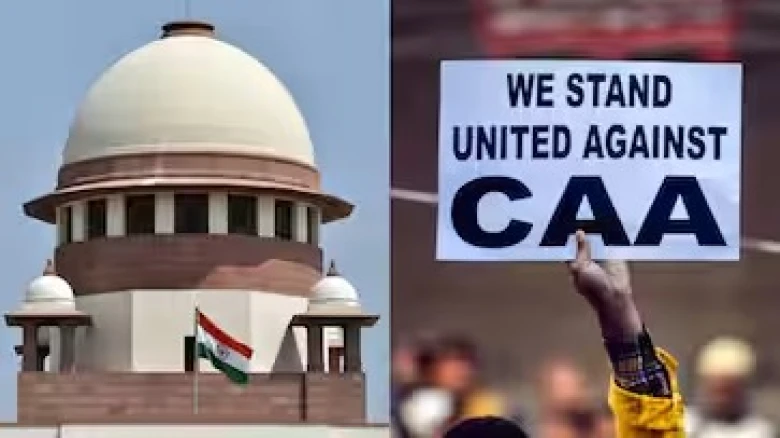The controversial bill was passed by Parliament almost four years ago on March 15, and the top court was now considering more than 200 petitions related to it.
Digital Desk: The Center asked the Supreme Court for more time on Tuesday so that it could respond to the petitions asking for a delay in the Citizenship Amendment Act regulations' implementation.
Solicitor General Tushar Mehta, speaking on behalf of the Center, told a bench presided over by Chief Justice DY Chandrachud, "It (CAA) does not take away citizenship of any person."
In response to the applications requesting a stay of the regulations until the Supreme Court determines the petitions contesting the constitutionality of the Citizenship (Amendment) Act of 2019, the Solicitor General stated he would want some time to react.
In response, Chief Justice Chandrachud gave the Center three weeks' notice and stated that the case will be heard on April 9 in court.
The controversial bill was passed by Parliament almost four years ago on March 15, and the top court was now considering more than 200 petitions related to it. A stay of the CAA and the Citizenship Amendment Rules 2024's execution is requested in the petitions.
The Indian Union Muslim League (IUML), based in Kerala, filed a case with the Supreme Court last week, arguing that the timing of the Center's implementation of the controversial law was dubious given the impending Lok Sabha elections. Senior Advocate Kapil Sibal brought up the plea.
The CAA is discriminatory against Muslims because of their faith, according to the petitioners opposing the law.
Additionally, it has been claimed that this kind of religious segregation is unreasonable and infringes on Article 14's right to excellence.
AIMIM chief Asaduddin Owaisi, Assam Congress leader Debabrata Saikia, Congress leader and former Union minister Jairam Ramesh, NGOs Rihai Manch and Citizens Against Hate, Assam Advocates Association, and a few law students are among the other petitioners in addition to the IUML.
The CAA Rules, 2024, which were used to implement the CAA, have also been contested by the IUML, Debabrata Saikia, Asom Jatiyatabadi Yuba Chatra Parishad (a regional student organization), Democratic Youth Federation of India (DYFI), and the Social Democratic Party of India (SDPI).
Kerala was the first state to approach the Supreme Court in 2020 to overturn the CAA on the grounds that it violated the Indian Constitution's guarantees of the right to equality.
Additionally, it has brought a second case to the Supreme Court contesting the CAA regulations.
In his appeal to the Supreme Court, Owaisi stated, "The evil posed by the CAA is simply not one of under-inclusion of grant of citizenship, but is very blatantly the isolation of a minority community to selectively take action against them consequential to the denial of citizenship."
According to the head of AIMIM, plans are underway to use the National Register of Citizens (NRC) to specifically target the Muslim population.
The Center had remained firm throughout the lawsuit, claiming that it would not impair citizens' legal, democratic, or secular rights and asking the court to reject petitions that attempted to overturn it.
Five years after the CAA was approved by Parliament in December 2019, the Central government carried it out on March 11. This led to widespread demonstrations around the nation and brought the law under close examination.
Under the CAA, citizens of Afghanistan, Bangladesh, and Pakistan who are members of the Hindu, Sikh, Jain, Parsi, Buddhist, or Christian communities and who arrived in India on or before December 31, 2014, as a result of religious persecution in their home countries, will have an expedited route to Indian citizenship. The Citizenship Act of 1955 is amended in this way.

Leave A Comment